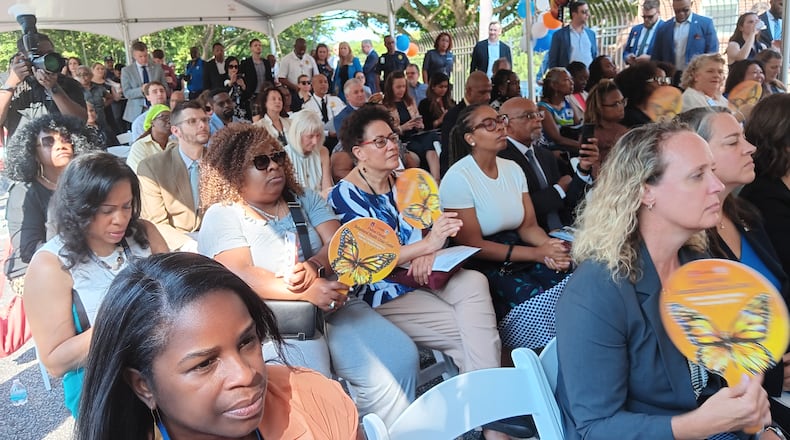No one could do it alone: that’s the message local, state and federal officials sent Thursday at a ribbon-cutting for Fulton County’s first public behavioral health crisis center.
Just as the center’s clients will need caregivers’ help with mental health or substance abuse problems, so all the agencies involved in building and operating the center had to lean on each other, speakers said.
This is only the first in a series of such crisis centers for the county, Fulton County Commission Chair Robb Pitts said.
“Experts say that we need at least three but one is better than none,” he said.
Georgia Department of Behavioral Health & Developmental Disabilities Commissioner Kevin Tanner said the new center is a model to be replicated elsewhere in the state. To cheers from the crowd, he said the state has approved planning funding for a second crisis center, to be built in Fulton County’s north end.
Neera Tanden, director of the White House Domestic Policy Council, represented President Joe Biden and Vice President Kamala Harris at the ribbon-cutting. On their behalf, she expressed gratitude for creation of a “role model facility for the nation.”
A cornerstone of administration policy is improved access to mental health care for everyone, Tanden said. Nationwide, more than $12 billion in American Rescue Plan Act funding has gone to provide mental health services, she said.
The new Fulton County center will serve as an example to Congress for how to deliver services where needs are, Tanden said.
“If Fulton County can do it, other parts of the country can do it,” she said.
The new center, added to the existing Oak Hill Child, Family & Adolescent Center at 2805 Metropolitan Parkway, was previously expected to open in mid-August. Now, despite Thursday’s ribbon-cutting, the facility won’t open to the public until sometime after Labor Day as it still seeks various certifications to provide specialized health care.
Shannon Sale, chief strategy officer for Grady Health System, said the center will have 110 employees: doctors, through a partnership with Morehouse School of Medicine; nursing staff; behavioral health and substance abuse specialists; pharmacists, and more.
Credit: Jim Gaines
Credit: Jim Gaines
Fulton County contributed the Oak Hill site and $15 million in ARPA funding for construction. The Georgia General Assembly appropriated $9.4 million in annual operating funds. And Grady Health System will operate the center under contract from the county.
State legislators and officials from Atlanta and other cities in the county’s south end worked together to make sure the project happened, Pitts said.
The closing of two Wellstar hospitals made health disparities in the area worse, he said, noting the closed East Point hospital was only a mile and a half from the new crisis center.
The center is part of the county’s commitment to addressing health care gaps in the area, Pitts said.
Atlanta Mayor Andre Dickens said dealing with community mental health takes a concerted group effort, and the variety of funding for the new center shows that dynamic. The new Center for Diversion & Services, underway now in the former Atlanta City Detention Center, will have a similar ribbon-cutting in a few months — and it too is a partnership with Fulton County and Grady Health System, Dickens said.
State Sen. Sonya Halpern, D-39, chair of the Fulton legislative delegation, said almost everyone is touched in some way by mental health issues. The center’s creation represents a commitment to not turning away anyone in crisis, she said.
Fulton Commissioner Khadijah Abdur-Rahman said the center will provide mental health care and community education on well-being. She praised County Manager Dick Anderson for steering the project at crucial points.
Credit: HYOSUB SHIN / AJC
Credit: HYOSUB SHIN / AJC
The new center is one of eight county initiatives that won 2024 Achievement Awards from the National Association of Counties.
A state study last year recommends eight more such crisis centers by 2032, including in metro Atlanta, central Georgia and the coastal region.
The 24-hour national suicide and crisis lifeline, reached by dialing 988, has already been very helpful; but the hotline must be able to connect callers to services in their own communities, Tanden said. Many hospitals in rural areas face closure too, so there is great need in those areas for crisis centers like this one, she said.
“We are confident that once those resources come on line additional centers can be budgeted, at least in part, at the federal level,” she said.
The existing Oak Hill center will continue to operate; the new 23,000-square-foot crisis center sits between the building’s previously existing wings.
The center is planned to offer three levels of care: walk-in outpatient, observation for 24 hours, or three to five days in a 24-bed crisis stabilization unit.
Credit: HYOSUB SHIN / AJC
Credit: HYOSUB SHIN / AJC
At full capacity it’s expected to serve close to 3,000 people a year.
The main lobby will be open to the public round the clock, every day of the year. Clients who just need to talk or help with a basic problem can go to one of several “living rooms” to meet with staff and be connected to services.
Funding has not yet been provided for the middle level of care, an 18-bed temporary observation unit.
The county and state Department of Behavioral Health & Developmental Disabilities asked legislators for $13.3 million a year in operating funds. Ultimately it received $5.7 million for the remainder of 2024, and $9.4 million for each subsequent year. That’s not enough to operate the 18-bed midlevel unit, but is consistent with funding requests for crisis centers elsewhere in the state.
About the Author
Keep Reading
The Latest
Featured




